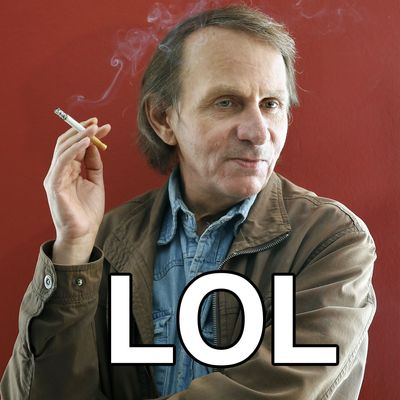
LOL just sneaked into an op-ed in America’s paper of record. The French novelist Michel Houellebecq, author of several society-satirizing books, wrote a piece for the New York Times on the failures of French leadership following the recent attacks in Paris. The French will survive, he argues, out of force of habit at least, but “it’s unlikely that the insignificant opportunist who passes for our head of state, or the congenital moron who plays the part of our prime minister, or even the ‘stars of the opposition’ (LOL) will emerge from the test looking any brighter.”
Houellebecq’s LOL — so blatant, so stone-cold sarcastic, highlighted by its parenthetical — is, as far as we can tell, the first time LOL has been used in a semantically meaningful way in a printed Times article. In the past, LOL has only been used in discussions of LOL as a word or phrase itself: In 2006, there’s a mention of a virus that replicates the phrase “lol that’s cool”; in 2011, there was an editorial mocking the OED’s adoption of the acronym. (A search of the archives reveals that LOL has made its way into a smattering of blog posts, where it’s deployed with meaning, if superficially.)
LOL was first codified in 1989 by Wayne Pearson on the Canadian message board Viewline as a way to communicate emotions otherwise invisible online. “A friend of mine who went by Sprout (and I believe he still does) had said something so funny in the teleconference room that I found myself truly laughing out loud, echoing off the walls of my kitchen. That’s when ‘LOL’ was first used,” Pearson writes. No other IRC slang or emoticon really captured “the fact that the other person just made you feel foolish by laughing out loud in a room all by yourself.”
But lately we use the acronym like Houellebecq does, not to express laughter, but to cast a bemused disdain on its target. Clearly, the “stars of the opposition” are utterly laughable in his mind. It’s not a giggle of amusement so much as a snort, a throwing-up-of-hands closer to the shruggie.
The meaning has shifted and intensified perhaps as the internet has become more depressing and less Utopian. We even have variations. For the extra-sarcastic, there’s the sighing despair lolllll (“I just got fired lollllll”) and the manic lololol (“Donald Trump!!! lolololol”). For friends I interact with on Gchat, it serves as punctuation to most sentences, a way to highlight the inherent absurdity of whatever we’re talking about, lol.
The new LOL fits Houellebecq’s signature nihilism. In fact, his most recent book, Submission, written far before the attacks, imagines an unresistant France under a charismatic Muslim president. “For 10 (20? 30?) years, our successive governments have pathetically, systematically, deplorably failed in their essential mission: to protect the population under their responsibility,” he writes in the op-ed. LOL.





























